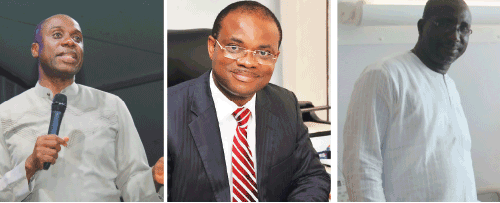Special Correspondent, JOE EZUMA, writes on the upland-riverine politics in Rivers and its impact on zoning of key political offices in the state.
Riverine-upland dichotomy continues to dominate political discourse in Rivers State. This is even as subterranean campaigns ahead 2015 gather steam and the Peoples Democratic Party (PDP) insisting on a level-playing field for all its governorship aspirants.
The party rose from a well-attended meeting of its State Executive Committee (SEC) on Tuesday, September 9, 2014 at its secretariat and took some far-reaching decisions that could alter the political equation in the state, among which was the discarding of the zoning of governorship seat.
In a communique read after the meeting by its state chairman, Felix Obuah, PDP condemned what it called “the nocturnal fraternity of a certain Board of Trustees (BoT) member from Rivers with Governor Rotimi Amaechi, who is the All Progressives Congress (APC) leader, to undermine the party under the guise of meeting of Stakeholders of Rivers State” and cautioned the BOT member to desist forthwith from attending such meetings which it viewed as inimical to its interest.
Obuah observed that the BOT member, contrary to PDP constitution, summoned meetings purporting to screen governorship aspirants, thus fanning the embers of disunity within its fold.
The statement read in part: “We therefore caution all members of the party to desist forthwith from attending any meeting summoned by the said Board of Trustees member, and/or any screening for elective positions conducted by any person or group of persons except as is properly constituted by the party.”
The three PDP BoT members in the state include Alabo Graham Douglas and Senator Adawari Pepple, who hail from the riverine side of the state that has been clamouring for power which it lost 12 years ago, and Victor Odili.
Obuah stressed that the party was going to observe and adhere to the best principles of democracy in choosing its governorship candidate in 2015.
“There will be no zoning on the basis of riverine-upland, senatorial zone or whatever.
“For the purpose of the 2015 elections, the party is poised to reclaim all its lost offices in the state. Consequently, the party shall ensure internal democracy and provide a level-playing field for every member seeking to contest any elective position.
“The state chapter of the PDP has not and shall not zone the governorship ticket of the party to any ethnic nationality, senatorial district or local government area. Consequently, all constitutionally qualified members of the party are free to vie for the party’s ticket to allow for the best candidate to emerge,” it stated.
Reaffirming its endorsement of the candidature of President Goodluck Jonathan for re-election, the party expressed its readiness to deliver the entire state delegates to him during the primaries and galvanise the electorate in the state to ensure victory for him. It added that the principle of party supremacy and discipline shall be upheld by the relevant organs of the party.
With the controversial outing, the party appears to have further stoked the highly emotive debate over zoning in the state, expressed in upland-riverine dichotomy. Gladiators of the debate include those who believe in the principle of number, as well as popular expression, which is being canvassed by the PDP executive committee. To members of this group, the so-called riverine-upland power allocation is undemocratic.
A PDP chieftain, who would not want to be dragged into the debate, however, told to our reporter: “Has there been any political dispensation where there are no aspirants contesting the governorship from either side of the riverine and upland in the same party? The answer is no.”
On the other side of the divide are the Ogoni sympathisers or the Rivers South-East agitators who claim, and rightly too, of being marginalised, having not produced any governor since the state’s creation. Among these are Senators Magnus Abe, Lee Meaba, Gabriel Pidomson and Dakuku Peterside who are angling to be governors in 2015.
This camp also believes that picking governorship candidate from the Andoni/Opobo/Nkoro axis which, although, is riverine but senatorially falls into the Rivers South-East will both serve the interest of the agitators. It supports the power rotation on the basis of senatorial zone, and would be the most favoured if it sails through.
Protagonists of the riverine-upland power equation are more from the core riverine areas of Kalabari and Bonny with predominant Ijaw descents. This explains why over seven PDP governorship aspirants come from this area. One of these aspirants, Nimi Walson-Jack, rests his argument on geo-political and moral realities, stressing that history cannot be changed because new Rivers cannot be created.
“Our fathers started it during the period of creation, during our youth. That was what we met in Rivers State. It has always remained like that. That is why when you have a governor from the upland, you have a deputy from the riverine. Never have we had a governor from upland in one senatorial district and another one from upland in another senatorial district. It has never been done in Rivers. That is the first part of it.
“The second part of it is that (former) Governor Rufus Ada-George and Governor Rotimi Amaechi come from the same senatorial district. So, under the rules of adherence to senatorial districts, Amaechi should not have run, and could not have run, as governor of Rivers State. But Amaechi ran because Ada-George, who comes from the same senatorial district with him, is from the riverine. That made it easy for him to run,” Walson-Jack argued.
He added that the goal-post cannot be shifted in the middle of the game.
“Two upland governors had served; it is only natural for the people of the riverine to demand that it goes to them,” he said.





